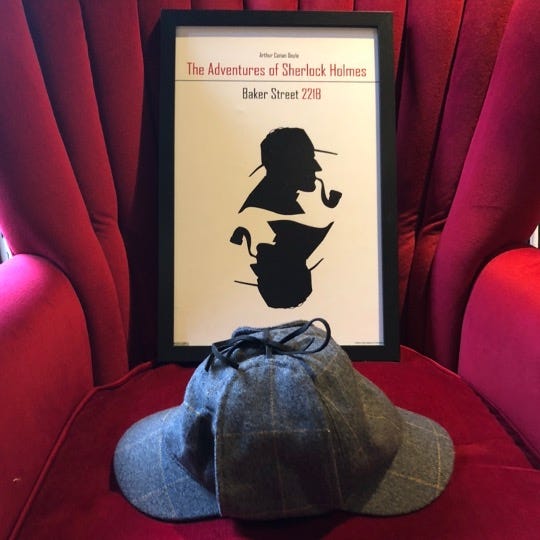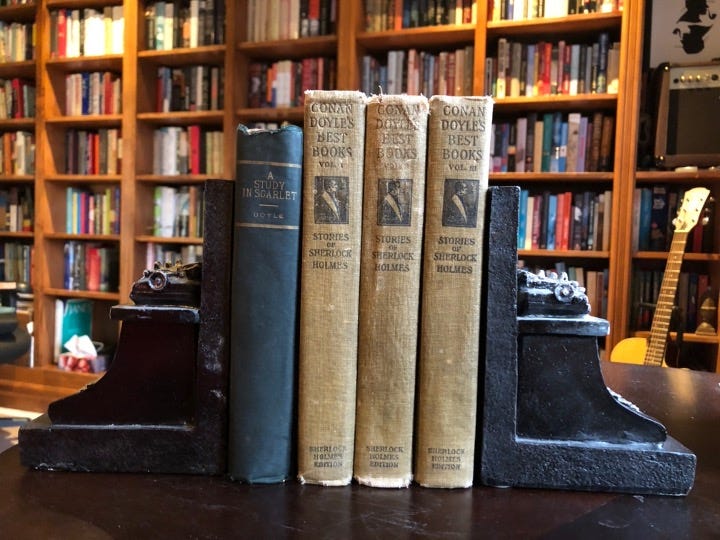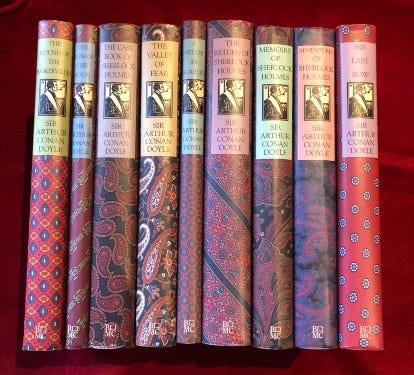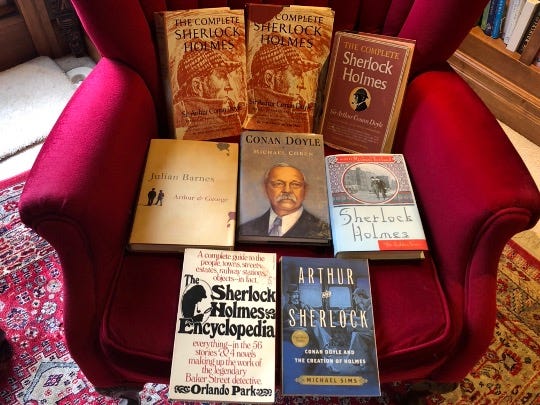Of course, I first learned about Sherlock Holmes when I was just a kid. Almost everybody did. He was, and remains, the most famous sleuth in the world. But I confess, I was late to reading those Sir Arthur Conan Doyle’s tales that so quickly and effectively cemented Sherlock Holmes’ longstanding (eternal?) popularity. I was already in my twenties when I finally read, in order, the four novels and 56 short stories that constitute what is known as “the canon.” I wish I’d read them all earlier. I loved not just the stories, the settings, the characters, and Sherlock’s extraordinary investigative prowess, but also the actual sentences themselves. Conan Doyle, a physician by training, wrote magnificent sentences. In the middle of a story, I found myself stopping, re-reading sentences, and marvelling at their balance, beauty and brilliance. Yet, his pristine prose never interfered with the story—a fine line to tread.
I wrote earlier in this space about my ambivalence towards Hemingway’s spare and sparse prose. Most of Conan Doyle’s Sherlock Holmes stories were written in an earlier era when longer, more elaborate and ornate sentences ruled the day. Perhaps I was born in the wrong time. I’ll take Conan Doyle’s prose over Hemingway’s any day, every day.
If you haven’t yet read any Sherlock Holmes stories, I encourage you to give them a try. And because the Holmes canon is in the public domain, you can actually find the stories and novels in ebook form, for free or at very low prices.
Sherlock Holmes in our library
Over the years, I’ve gathered around me various editions of the canon and other books about Conan Doyle and his creation, and I still re-read the 56 stories (often) and the four novels (occasionally).

Sherlock Holmes in my novels
As a member in good standing of the “write what you know” school of writing, most of my personal interests and passions somehow find their way into my novels. Sherlock Holmes is no exception. In my third novel, Up and Down, my narrator, David Stewart, and the other central character, Dr. Landon Percival, share a fascination with Sherlock Holmes. It comes up a few times in the story. In my fourth novel, No Relation, one of the members of self-help group the narrator, Earnest Hemmingway—no relation to the famous writer, hence the novel’s title—starts for people living with famous names, is an academic with the name Professor James Moriarty—the same as that of Sherlock’s arch-nemesis. Perhaps because of his name, the professor is passionate about Sherlock Holmes and his world. In neither novel does Sherlock Holmes play a central role. He’s simply lurking on the outskirts of the stories, I hope adding texture and colour.
The Bootmakers of Toronto
The Bootmakers of Toronto is my hometown’s official affiliate of the Sherlock Holmes Society of Canada. They’re a great group and meet regularly to discuss the canon and all things Sherlock Holmes.
I’ve spoken to The Bootmakers on two occasions about my interest in Holmes and the modest role the canon plays in two of my novels. I was thrilled when they granted me lifetime honourary membership in The Bootmakers of Toronto. They also gave me an authentic deerstalker cap imported from London.

Where to start reading Holmes?
While I prefer the short stories, for newcomers to Sherlock Holmes, I think it makes sense to start with Conan Doyle’s first Sherlock Holmes offering, the short novel, A Study in Scarlet, published in 1887. But thereafter, I’d turn to the short story collections, beginning with The Adventures of Sherlock Holmes (1892). Some stories are darker than others, but all are very cleverly crafted and told in absolutely lovely prose from a different time. If you love good writing, you’ll enjoy Conan Doyle’s sentences.
Thanks for having a look at this. Courtesy of this site’s analytics, I’ve noticed that these posts are opened—and presumably read—by far more people than are currently subscribed. I’d love to close that gap and turn the casual/occasional reader into a full subscriber. So if you’re not already a subscriber, it’s easy and free to sign up by clicking on the button below. Sharing this post with your networks also helps spread the word. Many thanks, and see you next week.












Hi Terry - a nice piece! I am with you in all things related to Sherlock Holmes. I first discovered the canon when I was in my late teens and have reread it several times. I very much agree with you as well when it comes to Hemmingway. For me, reading through several of his works seemed much more of a chore than a joy. (And I am delighted that your prose is much more in the style of Sir Arthur Conan Doyle's)!
I'd venture to say that your writing has a strong similarity to the Sherlock Holmes stories in at least one other way: "The Best Laid Plans" and sequels have a definite Watson-as-narrator-to-Angus'-Holmes-adventures vibe about them. That series isn't the only one of course -- The Great Gatsby springs to mind -- but I wonder if your love for those stories unconsciously influenced your choice of narrator for your first book?
I tried to read "The Seven-Per-Cent Solution" when I was 11 or so, and just found out it wasn't even written by Doyle... lol I delved into Agatha Christie at that point, and never got back to Sherlock Holmes (beyond movies and reboots and spin-offs). So I'll have to check those out! I'm assuming the first book is the first place to start?